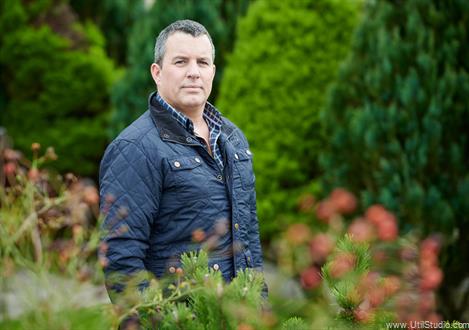A Quin-based patient advocate has pledged to continue monitoring government plans to introduce legislation extending medical cards to any patient with a terminal diagnosis of up to two years.
John Wall, who is living with prostate cancer, got a terminal diagnosis in July 2017. In March 2018, he travelled to University Hospital Gasthuisberg, Leuven in Belgium, and admitted without this treatment in this public hospital, he wouldn’t be still alive.
The air traffic controller said there is also need to make the application process to obtain a medical card and information provided to patients more user friendly.
“The campaign doesn’t stop. I will be taking a break, but there is a body of work to be completed in terms of the application process for medical cards and the information that has to be provided to patients and their families.”
John recalled the late Laura Brennan, Ennis, who campaigned extensively to increase the take up of the HPV vaccine, before she died in 2019 from cervical cancer, stated “I have a voice and I will use it” and in one of her last speeches stated “live the best life you can”.
“These two things have stuck with me through thick and thin. Living the best life you can is hugely important. At a time when Laura was nearing the end of her own life, I can hear her voice very clearly. It was a very powerful thing to say. She campaigned tirelessly for what she believed in for the benefit of others,” he said.
Stressing he is not a member of any political party, John praised the assistance provided by Labour Deputy Alan Kelly, who was extraordinarily generous with his time on and off line, despite the fact he didn’t even know him before embarking on this campaign.
Last November, Mr Wall had a couple of meetings with Health Minister Stephen Donnelly via Microsoft Teams and he has also been in regular contact with Department of Health officials in the background.
The Quin-based advocate has actively campaigned to achieve this latest change in the mainstream and social media.
“Over the last four or five weeks, I have found there has been huge traction about this issue on line. I used headlines to my own advantage and I found I was getting more and more traction. I hope I engaged respectfully.
“It was the combined effort of public support and support from the media to get this over the line.
“I am only a mouthpiece.”
John started this campaign in the summer of 2018.
“A terminal diagnosis means a lot to a lot of people. For me, I am living with a terminal diagnosis and not dying from. That is the way we live our lives in our home.
“This decision is something tangible and I can look back and say something was achieved from all this. It wasn’t just about achieving the terminal illness card, it the awareness that is created by the story that is told. We talk about prostate cancer, men’s health, the HSE and medical cards.
The medical card issue is one part of a larger story about peoples’ health.
“I engage with people of all ages and all sexes. When you choose to speak up, people engage with you and tell you a lot of personal stories. I have chats with people in private. I am not a qualified professional, I can only relay my own story. If that helps someone, so be it.
“I find it helps me too. When I am talking to people, people talk to me about their stories. There is a large community out there of people who engage on a regular basis. We swap stories. They are not all doom and gloom stories, they are life stories, funny stories and stories about how we have coped over the last year.
“Just because you have a terminal illness doesn’t mean you have to talk about having a terminal illness the whole time,” he said.
Mr Wall has acknowledged the latest breakthrough isn’t what he had initially set out to achieve but was a considerable improvement.
“While I did start out this campaign seeking medical cards for all terminally ill patients, it became apparent that Rome wasn’t built in a day and in order to achieve something it has to be achieved in incremental steps due to budgetary constraints, policy decisions and government departments have to agree to change before something like this is implemented.
About 18 months ago, Mr Wall sought an extension from 12 to 24 months as a reasonable interim step to the ultimate aim of achieving what is in the Programme for Government – to extend medical discretionary cards to all terminally ill patients.
In these difficult times in the midst of Covid-19 pandemic, he acknowledged he had to work within budgetary constraints to lobby for what is achievable.
Dan Danaher
East Clare correspondent, Dan Danaher is a journalism graduate of Rathmines and UL. He has won numerous awards for special investigations on health, justice, environment, and reports on news, agriculture, disability, mental health and community.



